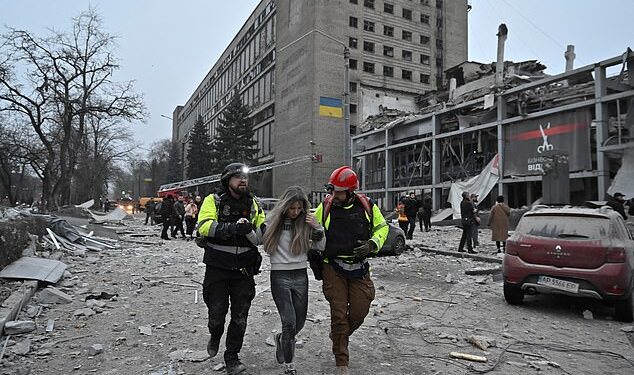A leading Ukrainian politician has slammed Labour for being too slow in helping his country and abandoning Britain’s leadership in the war effort as seen under previous governments.
Dmytro Kuleba, Kyiv‘s former foreign minister, said that Sir Keir Starmer‘s administration has broken with the previous governments by ‘just following the Americans’.
‘The Conservatives were coordinating with the Americans but they did not restrict themselves to just following the Americans,’ he told The Times. ‘This is the change that came with Labour. They took a position they would follow the Americans.’
President Zelensky has relied on Britain to galvanise Western support for Ukraine, with many countries following London‘s lead throughout the war, for example with the delivery of tanks and long-range missiles.
But while Boris Johnson was the first Western leader to visit Kyiv following Russia’s full-scale invasion and Rishi Sunak followed up to show the UK’s continued support, Starmer has not visited the country, adding to concern in Kyiv that his government is less keen to make diplomatic gambles.
‘Boris Johnson set the threshold high. Rishi Sunak had no other choice but to meet the threshold and push it further,’ Kuleba said.
‘When the Labour government came into office, we received rock-solid assurances things would continue as they were. To a large extent that was the case — except the story with the Storm Shadows.’
Kuleba, who resigned in September, said that he shared an ‘unpleasant conversation’ with British officials weeks before his resignation, when there was disagreement over the delivery and use of Storm Shadow missiles inside Russian territory.

Paramedics evacuate a woman from the site of a Russian missile strike, amid Russia’s attack on Ukraine, in Zaporizhzhia, Ukraine December 10, 2024

Dmytro Kuleba, Kyiv ‘s former foreign minister, said that he shared an ‘unpleasant conversation’ with British officials weeks before his resignation

Burning buildings are seen on site after a Russian drone attack in Chernihiv region, Ukraine, early Friday, December 13, 2024

Britain’s Prime Minister Keir Starmer speaks with Ukraine’s President Volodymyr Zelensky during the European Political Community Summit in Budapest last month
‘It was the first unpleasant conversation since the beginning of the full-scale invasion,’ he said. ‘Maybe the reason was the new government was cautious and they didn’t want to rush with decisions.’
The Labour government gave Kyiv the green light to use Storm Shadow missiles inside Russian territory after US President Joe Biden approved American ATACMS to be used in cross-border strikes.
It came as part of a drive by Ukraine’s backers seek to strengthen its hand before Donald Trump takes power in the United States.
The president-elect has vowed to ‘end the war in 24 hours’ and is expected to push for a quick deal to halt the fighting when he assumes office in January.
That has sparked fears in Kyiv and Europe that Ukraine could be pushed to make big concessions to Moscow after nearly three years of battling the Kremlin’s invasion.
In late November, Trump told Time: ‘I disagree very vehemently with sending missiles hundreds of miles into Russia. Why are we doing that?’
NATO chief Mark Rutte is set to hold talks with President Zelensky and several European leaders on Wednesday, with the discussions expected to centre on their ongoing support for Ukraine and the need for additional air defence.
European officials said that the leaders expected to attend include Sir Keir Starmer along with his French, German and Polish counterparts.
The meeting comes as Ukraine’s European allies have begun discussing the possibility of stationing foreign troops in Ukraine in case of a ceasefire with Russia.
Vladimir Putin has today boasted that his forces have the initiative along the frontline.
Russia’s army said Monday it had captured another village in eastern Ukraine’s Donetsk region, where its troops were steadily advancing.

Ukrainian serviceman of 24th brigade fires a RPG during a training exercise in Donetsk Oblast, Ukraine on December 15
The defence ministry said in a statement that its forces had ‘liberated’ the village of Yelyzavetivka, around 10 kilometres (six miles) south of Kurakhove, a resource-rich town Russian troops were also trying to seize.
November saw Russia seize an area the size of London at the same time as suffering its highest casualty rates of the war.
With more manpower and weapons, Russia’s army has been grinding through the eastern Donetsk region in 2024.
Russia has also claimed in recent weeks to have advanced in its western Kursk region, where Ukraine launched a surprise offensive in the summer.
Ukraine said Monday its troops had killed or wounded at least 30 North Korean soldiers who had been deployed by Russia to fight in Kursk.
‘On December 14 and 15, army units from the Democratic People’s Republic of Korea (DPRK) suffered significant losses near the villages of Plekhovo, Vorozhba, Martynovka in the Kursk region of Russia — at least 30 soldiers were killed and wounded,’ Ukraine’s military intelligence said.







